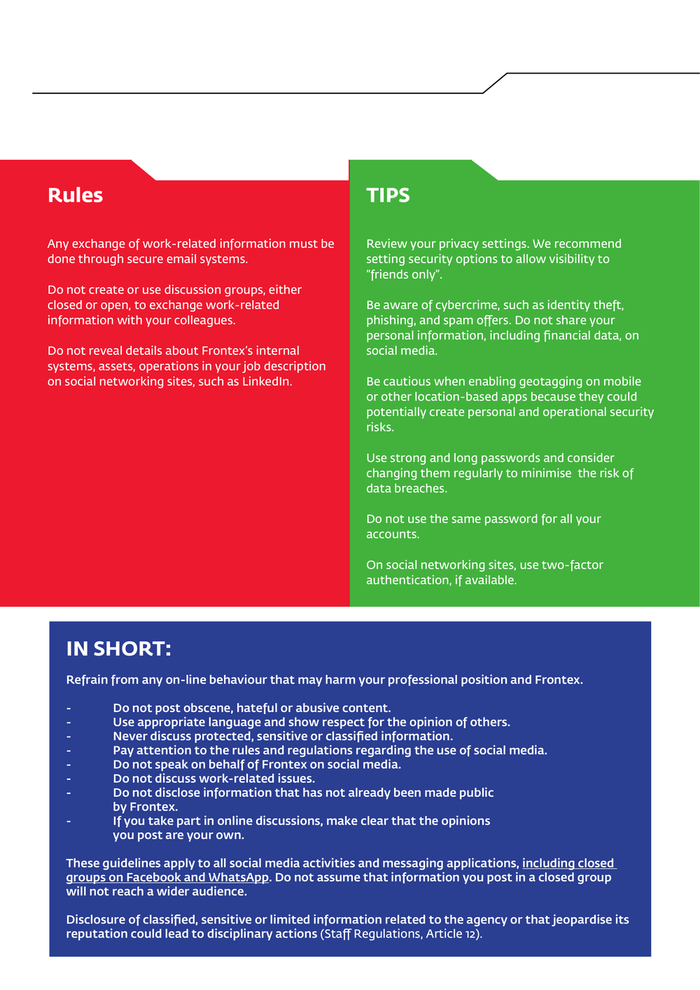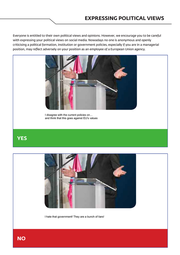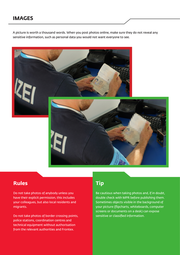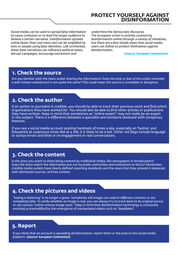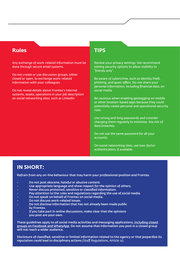socialmediaguidelinesfinal
Dieses Dokument ist Teil der Anfrage „Frontex Social Media Guidelines“
GUIDELINES FOR SOCIAL MEDIA USE

GUIDELINES FOR SOCIAL MEDIA USE Social media platforms allow people to create and also for the private and public sectors. Messaging share information directly with millions of users. services such as Messenger, Telegram and They can use a variety of formats, including text, WhatsApp are largely used to share opinions and pictures, audio and video. They are used to share information among individuals and groups. content, opinions, information, promote discussion and build relationships. While Frontex staff and persons involved in the activities coordinated by the agency should enjoy Popular social media platforms, such as sharing knowledge and maintain professional or Facebook, LinkedIn, Twitter, YouTube, Flickr and personal contacts with their colleagues online, we Instagram, have become important outreach and also have a duty to protect the agency’s reputation. communication tools not only for individuals, but Today it takes more than a press release to communicate effectively. This is why Frontex is active on a variety of social media channels. We are open and transparent and our goal is to explain what we do and why we do it to both external and internal audiences. We encourage you to share the content we publish, to send us your stories, photos and testimonials and to let the Frontex Media and Public Relations team know about any events or activities that could be promoted online. We do not want to limit your freedom of expression, but we care how an improper post could affect Frontex and its stakeholders. This is why we would like to provide you with some guidelines for the personal and professional use of social media.

You are responsible for content you publish on social networking sites, blogs or elsewhere online. Your actions online should reflect the core values of the European Union. Avoid any behaviour that could discredit yourself or Frontex, the European Border and Coast Guard Agency. Remember that your posts will stay online forever and may affect the reputation of Frontex, as well as your own. These rules and simple tips will help you use social media in your professional and personal life. As a general rule, only the Executive Director, spokespersons and other authorised staff are entitled to speak on behalf of the European Border and Coast Guard Agency. Official social media accounts of Frontex, the European Border and Coast Guard Agency, are managed by the agency’s Media and Public Relations (MPR) Office.

SOCIAL MEDIA RULES AND TIPS Rules Tips No classified, sensitive and protected information Separate private from professional Do not post information marked as classified, On social media, do not reveal details of your sensitive or limited, or that protected by a employment, including exact tasks, personal confidentiality clause within a contract. Do not share information about your supervisor and other details notes, emails (including attachments) and other of your work. On services such as LinkedIn, keep your information from internal meetings. If in doubt, talk profile general and only include information that to your supervisor or the Frontex Media and Public is already public. When you travel for work, do not Relations Office. reveal details of locations and tasks and do not tag yourself and other people when staying in hotels, Work-related information should stay off social media restaurants or other facilities. Think twice before posting photos from business trips. These could put We strongly discourage you from discussing work- you or others in danger. related details online unless it is information already made public or approved for public release. Do not Pay attention to language post photos or information from your deployments and missions with Frontex. Never tag yourself, nor Do not post obscene, hateful or abusive content and other people such as colleagues or participants, in show respect for the opinion of others. Even if you operational areas and do not disclose the name of write in your own capacity, you might be regarded as the agency, the name of the operation, location, a representative of Frontex. duration, equipment nor any other details that could compromise the activity or national authorities. Review your privacy settings Use your professional judgement before you post Maintain and review privacy settings on your social media accounts, change passwords regularly and You are responsible for what you post. The same rules consider using two-factor authentication where apply if you post something on Twitter, comment available. Be careful about the personal information under an article or photo in LinkedIn or express your you share. Read the rules described in the terms of opinion in a closed Facebook group. Even if deleted, a use and privacy policy of the social media you use. post can still be retrieved. Remember: when you join a social network, you sign Differentiate between opinion and official information a contract with that provider accepting the terms of use and services. When you post something related to our activities, make it clear that you express your personal opinion, Help us explain what Frontex does not that of Frontex. When you see someone make factual errors about Respect applicable law and copyrights Frontex on social media, help us correct it. We will help you formulate a response or clarify the On social media, use your own name or a chosen information on the institutional level. Please report alias. Do not create fake accounts. Do not such issues to HoO.MPR@frontex.europa.eu disseminate or create fake news or post materials protected by copyright without the written Separate facts from fakes permission of the copyright owner. Do not use the Frontex logo without the written permission from Social media can be used to spread false information. the Media and Public Relations Office. When sharing or reading an article or watching a video, check the source and the author to protect yourself against disinformation. If you need help, please contact HoO.MPR@frontex.europa.eu

MEETINGS AND CONFERENCES At Frontex, we want to explain our activities and mandate to the general public and often use social media to talk about the participation of the agency’s staff in conferences, meetings and study visits. Remember If you take part in a meeting or conference that your managers would like to communicate on, get in touch with Frontex’s social media and editorial team (HoO.MPR@frontex.europa.eu) ahead of time. Send us photos and short information about the meeting. Be aware that any information you present at conferences may be photographed and shared. If you present sensitive/limited, classified or protected information make sure to inform your audience about the rules regarding the distribution of that content. If you need help, please contact security at HoS.SEC@frontex.europa.eu Prior to attending a meeting, always ask the organisers if media are going to be present or whether the organisers intend to publicise your participation on social media. Rules Tip Frontex is a law enforcement agency and field Remember that if you post photos from your deployments should be seen as police missions. Do missions, even after working hours, your business not disclose any information about the purpose trips may be perceived as leisure activities at the of your trip, exact location, participants or other taxpayer’s expense. details that might compromise the aim of your mission.

Franca Francis 12 December at 12:45 4 December at 16:45 My name is Franca and I am working as fingerprinting After a hard day with @Frontex in #hotspot on #Lesvos expert on Lesvos as part of Frontex operation Poseidon. now it’s time for a pint! #operationPoseidon I am proud to be part of #Frontex #Poseidon and deployed in Greece! https://frontex.europa.eu/media-centre/our-officers/ YES NO Casper is in Hilton Madrid with John Smith Casper was travelling to Madrid, Spain from 07 May at 04:5 Poland - Warsaw 07 May at 04:05 Warsaw Another business trip with Frontex! #Frontex #operationIndalo YES NO

EXPRESSING POLITICAL VIEWS Everyone is entitled to their own political views and opinions. However, we encourage you to be careful with expressing your political views on social media. Nowadays no one is anonymous and openly criticising a political formation, institution or government policies, especially if you are in a managerial position, may reflect adversely on your position as an employee of a European Union agency. I disagree with the current policies on… and think that this goes against EU’s values YES I hate that government! They are a bunch of liars! NO

IMAGES A picture is worth a thousand words. When you post photos online, make sure they do not reveal any sensitive information, such as personal data you would not want everyone to see. . Rules Tip Do not take photos of anybody unless you Be cautious when taking photos and, if in doubt, have their explicit permission, this includes double check with MPR before publishing them. your colleagues, but also local residents and Sometimes objects visible in the background of migrants. your picture (flipcharts, whiteboards, computer screens or documents on a desk) can expose Do not take photos of border crossing points, sensitive or classified information. police stations, coordination centres and technical equipment without authorisation from the relevant authorities and Frontex.
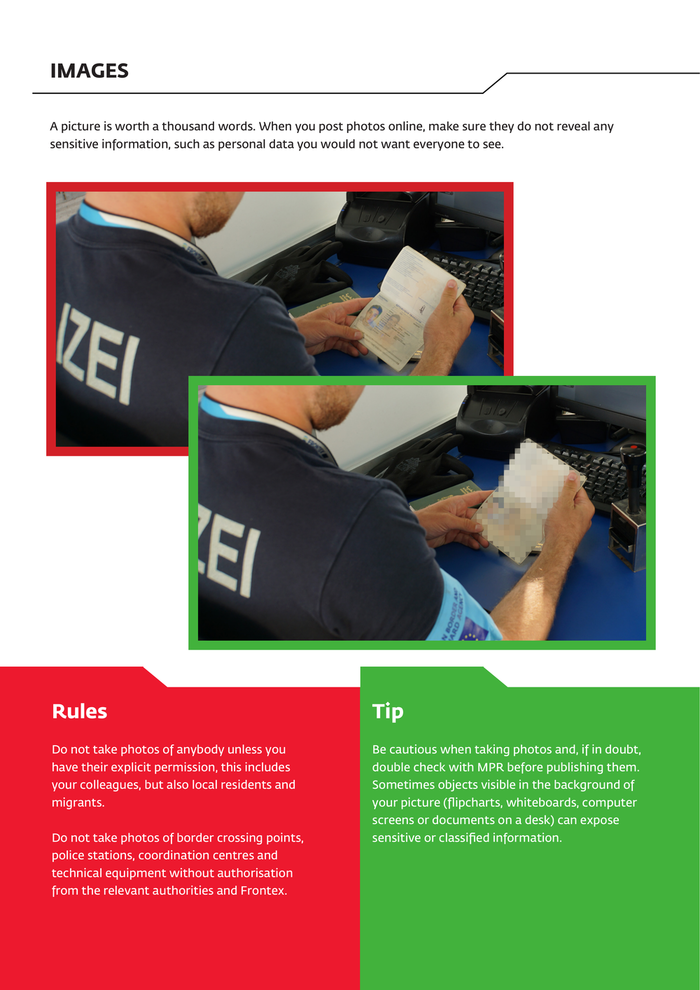
PROTECT YOURSELF AGAINST DISINFORMATION Social media can be used to spread false information undermine the democratic discourse. to cause confusion or to lead the target audience to The European Union is actively countering believe a certain narrative. Disinformation spreads disinformation online through a variety of initiatives, online faster than real news and can be amplified by but there are a few simple steps that social media bots or people using false identities. Left unchecked, users can follow to protect themselves against these false narratives can influence political views, disinformation. disrupt campaigns, encourage extremism and (Source: European Commission) 1. Check the source Are you familiar with the news outlet sharing the information? Does the look or feel of the outlet resemble a well-known website but is not quite the same? This could mean the source is unreliable or deceptive. 2. Check the author If an author or journalist is credible, you should be able to track their previous work and find which organisations they have worked for. You should also be able to find other articles or publications they have written. Keep in mind that sometimes an “online expert” may not really be an expert in the subject. There is a difference between a specialist and someone obsessed with conspiracy theories. If you see a social media account posting hundreds of times a day, especially on Twitter, and frequently at suspicious times like at 4 AM, it is likely to be a bot. Other red flags include language or syntax errors and little or no engagement in real conversations. 3. Check the content Is the story you want to share being covered by traditional media, like newspapers or broadcasters? Does the story match the information put out by public authorities and institutions or NGOs? Remember, credible media outlets have clearly defined reporting standards and the news that they present is balanced, with attributed sources, and has context. 4. Check the pictures and videos “Seeing is believing” is no longer a given. Sometimes old images are used in different contexts or are completely fake. To verify whether an image is real, you can always try to track back to its original source or use various “online reverse image tools.” Keep in mind that disinformation technology is constantly evolving as exemplified by the emergence of manipulated videos such as “deepfakes”. 5. Report If you think that an account is spreading disinformation, report them or the post to the social media platform. (Source: European Commission)
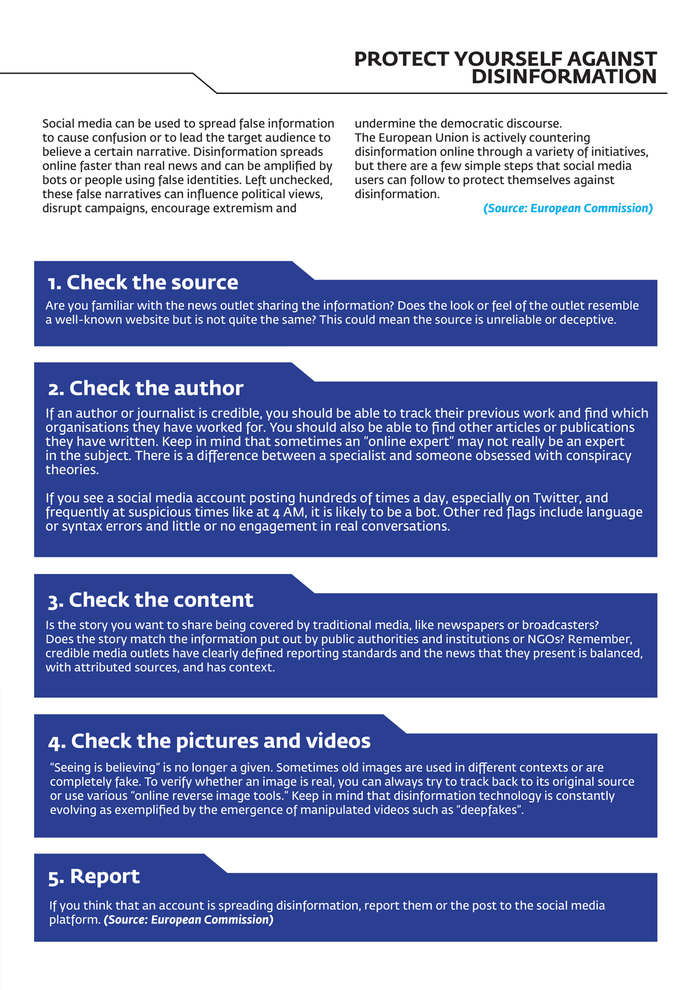
Rules TIPS Any exchange of work-related information must be Review your privacy settings. We recommend done through secure email systems. setting security options to allow visibility to “friends only”. Do not create or use discussion groups, either closed or open, to exchange work-related Be aware of cybercrime, such as identity theft, information with your colleagues. phishing, and spam offers. Do not share your personal information, including financial data, on Do not reveal details about Frontex’s internal social media. systems, assets, operations in your job description on social networking sites, such as LinkedIn. Be cautious when enabling geotagging on mobile or other location-based apps because they could potentially create personal and operational security risks. Use strong and long passwords and consider changing them regularly to minimise the risk of data breaches. Do not use the same password for all your accounts. On social networking sites, use two-factor authentication, if available. IN SHORT: Refrain from any on‑line behaviour that may harm your professional position and Frontex. - Do not post obscene, hateful or abusive content. - Use appropriate language and show respect for the opinion of others. - Never discuss protected, sensitive or classified information. - Pay attention to the rules and regulations regarding the use of social media. - Do not speak on behalf of Frontex on social media. - Do not discuss work-related issues. - Do not disclose information that has not already been made public by Frontex. - If you take part in online discussions, make clear that the opinions you post are your own. These guidelines apply to all social media activities and messaging applications, including closed groups on Facebook and WhatsApp. Do not assume that information you post in a closed group will not reach a wider audience. Disclosure of classified, sensitive or limited information related to the agency or that jeopardise its reputation could lead to disciplinary actions (Staff Regulations, Article 12).
